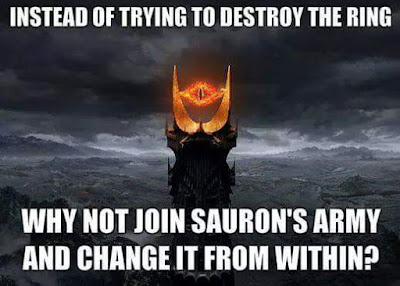Charles Salvo posts that it is not possible for moderns to be naively and unconsciously 'Traditional', comparing the retro tastes of the modern hipster who opts for vinyl, pipe and formalwear to our own predicament:
"The millenial is acting ironically. He makes a conscious decision to reject the contemporary option; it is not a habit, but rather an acquired taste.
We are in an analogous position. The world of our fathers no longer exists, so we can't absorb that worldview automatically without thinking about it much. Quite the contrary, we are faced with a choice since the worldview of the modern world totally surrounds us. Hence, we can no longer be naive, but rather we need to know exactly why we adopt one worldview while rejecting its alternatives.
For the innocent man, the will follows the intellect which was formed by family, society and church. The man of experience needs to consciously create."
In my last post, I tried to articulate some of the issues surrounding the choice of worldviews, or maps, but only hinted at why someone might reject the modern map (or maps), and adopt an alternative 'traditional' one. Of course the classic study on this is A Secular Age by Charles Taylor, in which he brings out the character of some of the different versions of these worldviews.
I mentioned the book The Gentle Traditionalist by Roger Buck, which articulates the argument for the orthodox Catholic worldview beautifully. But one major stumbling block that some may have with this is just that problem discussed above - that people like myself and Roger Buck are really just 'spiritual hipsters', choosing an outdated and retrogressive worldview just because it goes against the mainstream - we're just trying to be cool!
In one sense this is a definite danger. I want to point out here this excellent article about the 'Benedict Option', which both outlines this temptation, and gives the remedy.
The 'turn inwards' is the problem here. In declaring the world dangerous and pagan, and advocating a return to a monasticism and asceticism in Catholic communities which homeschool etc., the Benedict Option could tend towards a world-denying gnosticism, which would be to ignore the fact that, as the article above says, being Catholic is always a 'being-for-the-world'.
So the spectre of the gnostic heresy still haunts the Christian - it is the subtlest error to fall into. The only way to guard against it is to remember Christ's injunction to take up your cross and follow Him. And He will always lead you out of yourself and towards the other. That's when you realise your cross is also the cross of others.
Edit: Roger Buck has pointed out that whilst the Christian life should be oriented towards the other, some are called to live apart from the world, and even those who work in the world need solitude in order to pray. The exemplar here is Christ who went away into the lonely places in order to pray, but the monastic element of Christianity has been fundamental to it. Valentin Tomberg said "Just as a fish needs water to breathe, so the monk needs the solitude of the cell".
Equally, the image on my post perhaps shows the absurdity of thinking you can change a culture from within; being in the world but not of it is the phrase that is usually used to describe the attitude I would want to emulate.
.

No comments:
Post a Comment